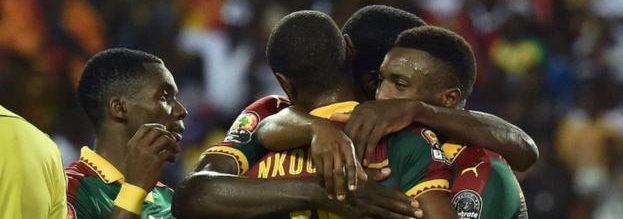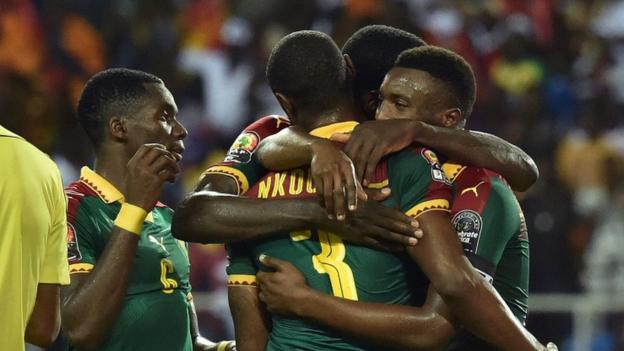Gabon’s Africa Cup of Nations: Scrappy build-up, strong finish

The football at Afcon 2017 was highly entertaining, but it happened against a backdrop of simmering discontent in Gabon.

Cameroon defeat Egypt 2-1 in a thrilling final in Gabon.
On the pitch, at least, no Africa Cup of Nations (Afcon) is ever counted a failure. Off the pitch, the record is more ambivalent.
Cameroon lifted their 5th Afcon title on Sunday night, beating Egypt 2-1 in a thrilling final. With the Stade de l’Amitie at 40,000 capacity, fireworks streaking across the Libreville night sky and locals turning out to hail popular champions, Gabon’s President Ali Bongo suddenly looked like a man vindicated.
Co-hosts with Equatorial Guinea as recently as 2012, there is still a lingering sense that this tournament returned to Gabon at the wrong time, and at too high a price. A population of 1.5 million now has four international-standard football stadiums, while public sector budget cuts and declining oil revenues continue to squeeze living standards.
The leaked organising committee budget put the cost to Gabon at $500 million, a figure not denied by the government and consistent with private estimates by the Confederation of African Football (CAF). Half of that has gone on stadiums, the other half on logistics, inflated commissions and hospitality inevitably tied to the biennial jamboree. Afcon has been a boon to Libreville’s five-star hotels, less so to the slum of Venez Voire.
But simmering discontent is about more than the economics. The fallout from last August’s disputed presidential election is still palpable. Protests against Ali Bongo’s 6,000-vote victory – a final tally bolstered by an anomalously late 95% incumbent share in the Bongo family home province of Haut-Ogooué – were sustained and significant before a government crackdown.
[Gabon’s presidential election: are the opposition’s attempts at unifying too little too late?]
The Afcon facilities may be finished but the National Assembly building remains gutted by fire, with smashed windows and smoke damage visible from the Boulevard Triomphale. At the headquarters of the opposition candidate Jean Ping, bullet holes and blood still mark the walls after the building was raided by the Presidential Guard on 31 August 2016. The severity of the response – there is credible evidence of at least two dozen dead in Libreville alone, along with 1,000 arrests – has left the opposition paralysed ever since.
While younger activists voice their frustration that the football tournament has not been used to reinvigorate the street movement, older heads – including Ping himself – have refused to call for a boycott. “We didn’t want to call for a boycott of the football. Doing that would punish all of Africa for our problems,” he said, a touch unconvincingly. The opposition leader instead pins his hopes on a managed transition via international intervention, though this looks unlikely while foreign leaders, most importantly those in Paris, have other priorities.
In the end, a limited protest on 14 January was called in Place Rio in downtown Libreville, but three truckloads of police and a few volleys of tear gas brought things to a swift end. Four men were then arrested on 21 January for carrying anti-Afcon signs in the city and spent five days in prison before being released on bail. Other pressures are more subtle. Gabonese seeking to collect evidence of the dead and disappeared from last year have faced arrest and intimidation.
No rival to the greats
Attendance at games has in fact been decent by Afcon standards, although it would be fair to say that Gabonese nationals have largely stayed away from games not featuring Les Pantheres, who exited at the group stage. Critics have focused on the 1,800 crowd at Tunisia’s victory over Zimbabwe in Libreville on 23 January, but expat communities have turned out in force elsewhere, not least Burkinabes who saw their exciting, progressive team advance to the semi-finals. Just under 20,000 watched Les Étalons’ dramatic semi-final defeat to Egypt at the Stade de L’Amitie. Malians meanwhile ensured 10,000-plus crowds in Port-Gentil, while Cameroon’s success brought many to Franceville and Libreville.
Whether the quality of the football is improving is another question. One the one hand, general standards have lifted – more teams reach a certain minimum quality, competition is healthy, and World Cup qualification is a realistic ambition for at least half the federations. Burkina Faso were a breath air. Aliou Cisse’s Senegal looked strong until a penalty shoot-out defeat to Cameroon in the quarter-finals. Egypt, after missing the last three Afcons, have returned to strengthen the North African contribution. DR Congo impressed again, while minnows Zimbabwe and Uganda fell short but entertained.
But there is currently no exceptional national side to rival the great Nigeria, Cameroon and Egypt teams of the past. Senegal came into this tournament as the highest ranked African country in the world at No 33. But an African World Cup winner is an unlikelier prospect today than 20 years ago.
In any event, there are other metrics more important to CAF: the television audiences across Africa and the world. A billion-dollar broadcasting deal signed with the French media company Lagardere in 2015 runs until Afcon 2028 (a deal currently under investigation in Egypt for potential breaches of competition law). A new sponsorship deal with TOTAL will also keep the revenue flowing.
Whatever the enduring systemic problems in African football, the Cup of Nations continues as a totem to CAF President Issa Hayatou’s 30-year stewardship. Hayatou’s CAF re-election bid in March 2017 is almost certain to succeed, though new Fifa President Gianni Infantino, who is no fan of the 70-year-old Cameroonian, is manoeuvring his support for rival candidate Ahmad Ahmad of Madagascar.
Infantino’s planned expansion of the World Cup to 48 teams should mean as many as ten African teams taking part in 2026, and grants to the federations are being doubled. As ever, below the surface and beyond the shiny stadia, politics and finance will do much to shape what happens both on and off the pitch.
Taimour Lay is a journalist and practising barrister. Follow him on twitter at @TaimourLay.




